
Leila realized suddenly that she was standing in the shadow of the tower and that the man did not see her.
Neither did the fitful light of the waning, cloud-wrapped moon permit her to see who the man was. He wandered slowly up the wall like a man who was lost in thought. He walked like a man who did not dream he was being watched.

Leila would have gone inside without disturbing him, but the door to her apartments was beyond him. If she went in through the tower, she would have to pass through the hall, and this she did not dare. One could hear the laughter and the music whenever a servant went into the hall or came out into the night. All of Leofric’s family was there assembled. Even her eldest son was there.
But there was one man who was not. He did not walk like Leofric or young Sigefrith, and he was not tall enough to be the King, she thought. He must have been one of Leofric’s nephews, or perhaps Sir Brede. She did not know them well enough to say.
Oh, if only it were Alred! She would have gone to Alred. He was the only man who spoke to her out of anything other than the duty of politeness. But Alred might never come again.
Leila only wished the man would go away so she could return to her room. She no longer wished to be outside. Her room was warm and full; outside was cold and wide and empty.
She stepped out of the shadows, but she turned her profile to the man. He would see her there, but he would see that she did not expect him to speak to her.
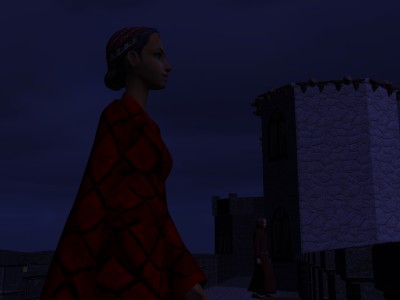
He saw her, but he did not understand. He walked quickly to her side and bowed. “Lady Leila, I beg your pardon. I did not see you standing there. I have been very rude.”
“Not at all.”

It was Sir Godefroy. She had forgotten him. She had only met him once, on the day he arrived, but her eldest son played every day with his son Conrad, for they were nearly the same age.
“I did not think I would see anyone out here tonight,” Godefroy said.
“I would not be welcome in the hall in any case,” she muttered, unable to suppress the trace of bitterness that could be heard in her voice.
“That was not what I meant,” he said gently. “I thought of the cold.”
“Oh.” Leila was thankful that the dark of the night and the dark of her skin hid her flush.

After a moment of uncomfortable silence, he said, “I suppose it must never be so cold in your country.”
“On the contrary, it can be very cold in the desert at night. Water can freeze in certain seasons. But it is cold and dry, not cold and wet. It is easier to bear.”
“Do you miss it?”
“The cold?”
“Your country.”
Leila did not know what to say. She did not know herself. And so, strangely, she told him what she thought rather than what he expected to hear.
“It is not the country I miss,” she said fretfully. “It is my girlhood. It is my old life. I miss my father and my family. But my father would kill me if I went back to him now. My old life is gone. My girlhood is gone. So it is as if the country is gone, as well.”
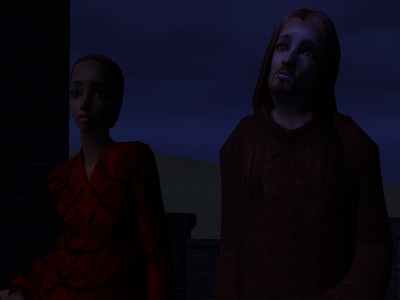
“Is it true? I cannot comprehend such a crime. That your father would kill you?”
“Yes, it’s true. Or my brothers, if he is no more. I have dishonored my family.”
“I have been told that you helped Lord Hingwar escape from slavery.”
“That is my crime.”
“He seems to repay you by making you prisoner.”
Leila could not find a reply to this.

“Forgive me, my lady,” he said after a moment. “You have been frank with me, a stranger, and so shall I be with you. Tonight I am angry at all men who do not love the wives they have. It is five years ago this night my wife died.”
“Oh… I’m sorry.”
“But I should think as you. It is as you say. My old life is gone. Even that country is gone. You teach me a good lesson tonight.”
“I didn’t mean to teach you anything. Certainly not that.”
“I lived with her for five years and five months. Soon I shall say that I live longer without her. Perhaps it will be easier then.”
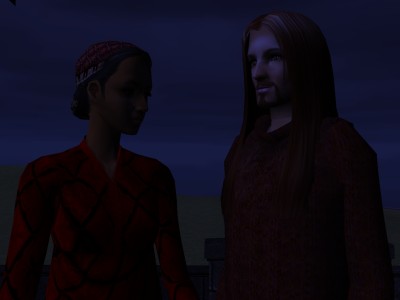
“I don’t know,” she murmured.
He stared up at the darkened moon until the cloud passed, and then he turned back to her and smiled, as if a cloud had parted from his own face.
“It is inexcusable of me to think of a dead lady when I have a living lady before me. And I say such things, to which a saint could not reply.”
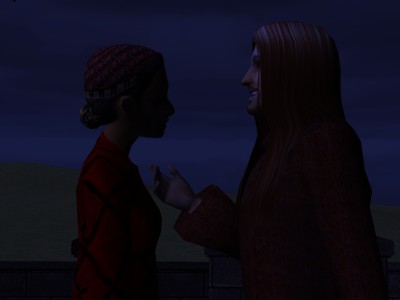
“I’m certain you came out to be alone. You cannot be blamed.”
“I did, but I am not sorry we meet. I don’t know why I do, but it is not often I dare to speak so frankly to a lady.”
“It is not often I speak to anyone at all,” she said without thinking and then winced.
“Does he forbid it?” he asked gravely.

“I don’t know. They are all polite to me, but no more. Perhaps the ladies would visit me, but it is too far.”
“Fortunately you have your children.”
“Of course. But one cannot speak one’s thoughts to children.”
“It is true, but nor can one speak one’s thoughts to adults. I find. Except tonight,” he smiled and waved at the moon and the wide, empty darkness below. “Or to you.”
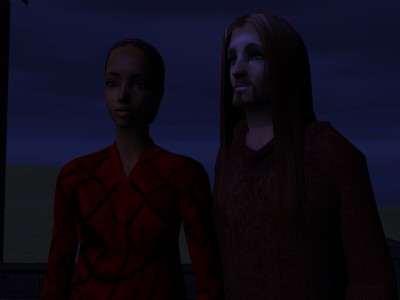
“I don’t know.”
“If it is not forbidden, I shall speak to you another night and then we shall know.”
“Do you play chess?” she blurted.
“Chess?”
“It is a game… a thinking game… but one may speak while playing…”
He smiled. “If one may speak while thinking, then I would be happy to learn.”
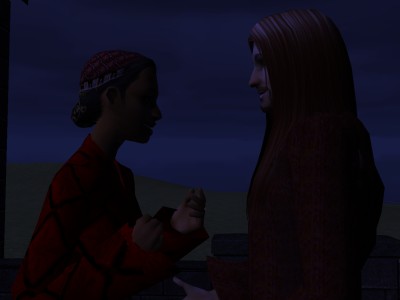




Poor Leila to feel like your not wanted by people is a horrible feeling.